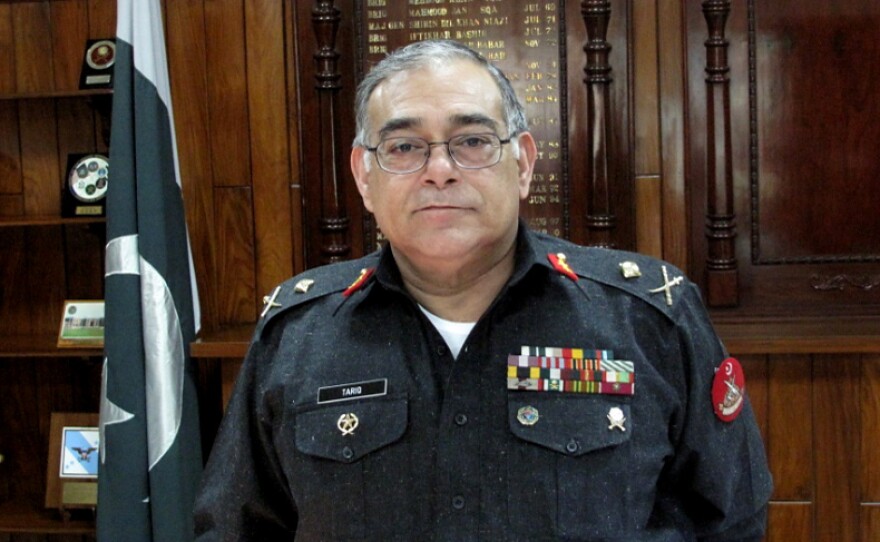In the high-tech war against al-Qaida and the Taliban, much depends on an old-style fighting force. Even as American drones fly over Pakistan hunting militants, a local militia called the Frontier Corps has done much of the recent fighting on the ground in the country's northwest.
The Frontier Corps, which recruits from tribal areas near the border, is headed by Maj. Gen. Tariq Khan. Speaking to NPR's Steve Inskeep in a massive, centuries-old fortress that overlooks Peshawar, Khan said his men are clearing the nearby mountains of Taliban and al-Qaida fighters.
Khan's forces are spread out to the north and west of the city, in Pakistan's mountainous tribal regions. After being recruited from ethnic Pashtun tribes near the Afghan border, its soldiers stay close to their homes.
Khan says he's making progress — and that Peshawar has undergone a reversal from a few years ago, when violence ruled the city. Gone are the kidnappings and suicide attacks that had become daily occurrences, and NATO convoys into Afghanistan are no longer under constant threat, he said.
Working in an area that has always been outside the government's direct control, the Frontier Corps has traditionally been a lightly armed force. But they have recently received American body armor and a few sniper rifles.
They are engaged in heated battles with militants. The morning he spoke to NPR, Khan learned that one of his lieutenant colonels had been killed in a firefight.
You can take a Pashtun, and he's a very, very complicated kind of a person, with murder in his heart and poetry on his lips.
In what he called "a very, very intense engagement," Khan said that the officer was leading an attack on a group of militants, but he "made the mistake of telling these people to lay down their weapons. He should have just shot at them."
The Frontier Corps troops are kept separate from Pakistan's army. In colonial times, the British created this paramilitary force to patrol so-called tribal agencies, or territories. In recent years, Khan's force has changed its tactics to suit its conflict with the militants. For starters, it is no longer what he calls "fort-bound."
"We've started patrolling the area by day and by night," he said. Patrols are linked together, and troops leapfrog one another to better detect the militants' movements.
"We've started doing a lot of night operations," Khan said. "That has helped us a lot."
Asked if that means his troops have been supplied with night-vision optics, Khan said, "No. But do remember that there were night operations before there were night-vision devices, too. We've had to go back to basics."
The Frontier Corps has also tried to win the confidence of the locals and prove that they can protect them from the militants. When that succeeds, Khan said, "We've been able to build up a local, village-based defense" — turning over control to the locals. That way, he can put his troops in the field instead of using them to hold ground.
Most of Khan's troops operate in areas where they have strong ethnic and tribal ties. "They will never be integrated into the army," Khan said. "The army follows command and control through proper procedures. Here, you have people parted by one kilometer in between. The only bond they have between them is tribal."
Noting that the system's strength comes from historical traditions, Khan said, "This can't change. If you want to change that, you'll not have the Frontier Corps."
Khan said that eventually the tribal region should be brought under tighter central control, with the provincial governments. But it will take at least three to five years to do that, in his view. And for the changes to succeed, Khan said, the government needs to rehabilitate the area and help it develop.
Like his soldiers, Khan has deep roots in the Pashtun region. "My family has 400 years of lineage there. And most of the people recognize me."
Of the Pashtun region, Khan said, "It's a very strange environment, and it's a very different kind of people that you work with. They have an exaggerated perception of their own history."
Asked to explain, Khan said, "You can take a Pashtun, and he's a very, very complicated kind of a person, with murder in his heart and poetry on his lips."
Speaking about the tribal system of government that holds sway in the mountains to the north of Peshawar, Khan said, "We may not agree with it, it might be very primitive — but it kept peace there for 5,000 years."
In working with the Frontier Corps, Khan has sometimes been forced to go against the lessons he was taught growing up in the area. For instance, Khan's grandfather once told him not to question or disrespect his elders. But that didn't stop him from chastising a tribal elder who had given help to militants in Bajaur, on the Afghan border.
"You're not a good Pashtun," Khan told the man. "You let militants come here, they took away your women and children. You should be ashamed of yourself."
As Khan recalls, the man stood and began to cry. He held Khan's chin — a sign of submission in the region.
"Where were you before this?" Khan remembers the man asking. "Where was the government? Where were you people when we were being decimated and killed?
"I thought it was a very valid question," Khan said.
Copyright 2022 NPR. To see more, visit https://www.npr.org. 9(MDAzMjM2NDYzMDEyMzc1Njk5NjAxNzY3OQ001))






